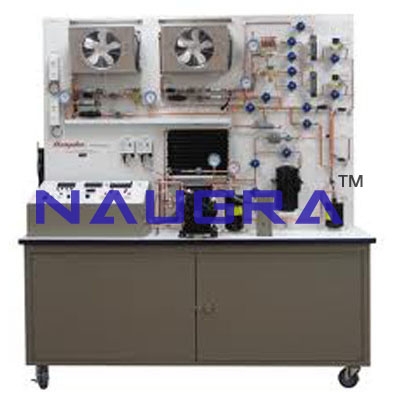Basic Cycle Refrigeration Trainer Data Acquisition- Engineering Lab Training Systems.
Technical Description
The most common form of refrigerating
installations is a refrigeration system with compressor. The physical
effect of absorbing heat from the environment during transition from
liquid to gaseous state of the refrigerant is used (evaporation
enthalpy).
The design of represents a typical refrigerant circuit
consisting of a hermetic compressor, a condenser, an evaporator and an
expansion element. Condenser and evaporator are finned tube heat
exchangers. The tubes of both heat exchangers are partly transparent to
visualize the process of phase transition during evaporation and
condensation. Three capillary tubes of different length and a
thermostatic expansion valve can be compared as expansion element.
The
trainer is fitted with a collector for the refrigerant. The collector
can be used to study the refrigerant underfilling or overfilling of the
system.
The refrigerant flow rate is read of a flow meter.
Temperatures and pressures in the refrigerant circuit and the electric
power consumption of the compressor are measured with sensors, displayed
digitally and transferred for further processing to the software.
Parameter changes in the refrigeration cycle are dynamically visible in
the log p-h diagram of the software.
The well-structured instructional material sets out the fundamentals and provides a step-by-step guide through the experiments.

